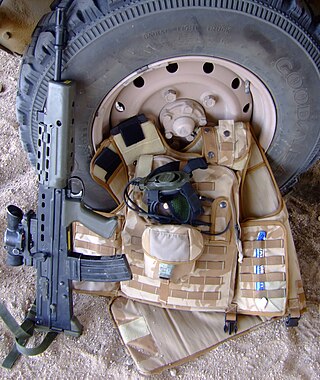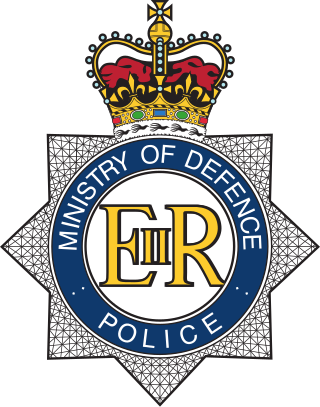Related Research Articles

The Home Office (HO), also known as the Home Department, is a ministerial department of the British Government, responsible for immigration, security, and law and order. As such, it is responsible for policing in England and Wales, fire and rescue services in England, visas and immigration, and the Security Service (MI5). It is also in charge of government policy on security-related issues such as drugs, counter-terrorism, and ID cards. It was formerly responsible for His Majesty's Prison Service and the National Probation Service, but these have been transferred to the Ministry of Justice.

Law enforcement in the United Kingdom is organised separately in each of the legal systems of the United Kingdom: England and Wales, Northern Ireland and Scotland. Most law enforcement is carried out by police officers serving in regional police services within one of those jurisdictions. These regional services are complemented by UK-wide agencies, such as the National Crime Agency and the national specialist units of certain territorial police forces, such as the Specialist Operations directorate of the Metropolitan Police.
The Serious Organised Crime Agency (SOCA) was a non-departmental public body of the Government of the United Kingdom which existed from 1 April 2006 until 7 October 2013. SOCA was a national law enforcement agency with Home Office sponsorship, established as a body corporate under Section 1 of the Serious Organised Crime and Police Act 2005. It operated within the United Kingdom and collaborated with many foreign law enforcement and intelligence agencies.
The Criminal Investigation Department (CID) is the branch of a police force to which most plainclothes detectives belong in the United Kingdom and many Commonwealth nations. A force's CID is distinct from its Special Branch. The name derives from the CID of the Metropolitan Police, formed on 8 April 1878 by C. E. Howard Vincent as a re-formation of its Detective Branch. British colonial police forces all over the world adopted the terminology developed in the UK in the 19th and early 20th centuries, and later the police forces of those countries often retained it after independence. English-language media often use "CID" as a translation to refer to comparable organisations in other countries.

Angel Road was a railway station in Edmonton in the London Borough of Enfield, north London, on the Lea Valley line that forms part of the West Anglia Main Line, 7 miles 57 chains (12.4 km) down the line from London Liverpool Street. It was between Northumberland Park and Ponders End in Travelcard zone 4 and had the three-letter station code AGR. It is located beneath the A406 flyover of Meridian Way, and was accessed via a footpath from Conduit Lane, on an adjacent flyover to the north. The station's immediate surroundings include non-manufacturing industrial businesses and a former gas works.
The United Kingdom National DNA Database is a national DNA Database that was set up in 1995. In 2005 it had 3.1 million profiles and in 2020 it had 6.6 million profiles. 270,000 samples were added to the database in 2019–20, populated by samples recovered from crime scenes and taken from police suspects. 124,000 were deleted for those not charged or not found guilty. There were 731,000 matches of unsolved crimes between 2001 and 2020.

The Police Staff College, Bramshill, Bramshill House, Bramshill, Hampshire, England, was until 2015 the principal police staff training establishment in England and Wales.
Peter William Neyroud CBE QPM is a retired British police officer. He was the Chief Executive Officer for the National Policing Improvement Agency (NPIA), and former Chief Constable of Thames Valley Police. He announced his retirement from the NPIA in March 2010.

The National Policing Improvement Agency (NPIA) was a non-departmental public body in the United Kingdom, established to support police by providing expertise in such areas as information technology, information sharing, and recruitment.

The North Rhine-Westphalia (NRW) State Police Force is the largest of the 16 German state police forces with around 50,000 personnel.

Osprey body armour is a system of body armour used by the British Armed Forces. The system is in its fourth iteration following extensive development and engagement with front line users.

The National Crime Agency (NCA) is a national law enforcement agency in the United Kingdom. It is the UK's lead agency against organised crime; human, weapon and drug trafficking; cybercrime; and economic crime that goes across regional and international borders; but it can be tasked to investigate any crime. The NCA has a strategic role as part of which it looks at serious crime in aggregate across the UK, especially analysing how organised criminals are operating and how they can be disrupted. To do this, it works closely with regional organised crime units (ROCUs), local police forces, and other government departments and agencies.

The Ministry of Defence Police (MDP) is a civilian special police force which is part of the United Kingdom's Ministry of Defence. The MDP's primary responsibilities are to provide armed security and counter terrorism services to designated high-risk areas, as well as uniformed policing and limited investigative services to Ministry of Defence property, personnel, and installations throughout the United Kingdom. The MDP are not military police and should not be confused with the Royal Military Police or any other British Service Police. Service personnel often refer to the MDP by the nickname "MOD plod".
The Indian Ordnance Factories Service (IOFS) is a civil service of the Government of India. IOFS officers are Gazetted defence-civilian officers under the Ministry of Defence. They are responsible for the administration of the Indian Ordnance Factories, which provide the indigenous defence production capabilities of India.
Initial Police Learning and Development Programme (IPLDP) is the curriculum for the initial training of police officers within England and Wales.
The Director General of the National Crime Agency is the head of the National Crime Agency in the United Kingdom, and as such is responsible for the overall management of the NCA. The Director General is appointed by, and reports to, the Home Secretary, but is not directly part of the Home Office. The Director General is appointed on a five-year term basis, though this can be renewed or extended at the Home Secretary's discretion.
Immigration Enforcement (IE) is a law enforcement command within the Home Office, responsible for enforcing immigration law across the United Kingdom. The force was part of the now defunct UK Border Agency from its establishment in 2008 until Home Secretary Theresa May demerged it in March 2012 after severe criticism of the senior management. Immigration Enforcement was formed on 1 March 2012, becoming accountable directly to ministers.
The National Police Library in the United Kingdom is a library classed as a special library and research library. It is part of the College of Policing, funded by the Home Office. It is only accessible to current serving police and police staff in the United Kingdom and is Europe's largest policing library.

Patrick Joseph McGuinness is a former senior British civil servant who now advises businesses and governments globally on their resilience, crisis, technology, data and cyber issues.
References
- ↑ "Central Police Training and Development Authority- Annual Report and Accounts for the year ended 31 March 2007". 1 July 2008.
{{cite journal}}: Cite journal requires|journal=(help) https://assets.publishing.service.gov.uk/government/uploads/system/uploads/attachment_data/file/248445/0900.pdf - ↑ "Central Police Training and Development Authority (CENTREX) Website".
- ↑ "Central Police Training and Development Authority- Annual Report and Accounts for the year ended 31 March 2007". 1 July 2008.
{{cite journal}}: Cite journal requires|journal=(help) https://assets.publishing.service.gov.uk/government/uploads/system/uploads/attachment_data/file/248445/0900.pdf - ↑ "But we told you first. Controversial police training college to shut in May". Warrington Guardian. 27 July 2005. Retrieved 2022-11-03.
- ↑ "National Crime Agency to 'relentlessly pursue' organised crime". BBC News. 6 October 2013.
- ↑ "Home - National Crime Agency". www.nationalcrimeagency.gov.uk. Retrieved 2022-11-03. http://www.nationalcrimeagency.gov.uk/